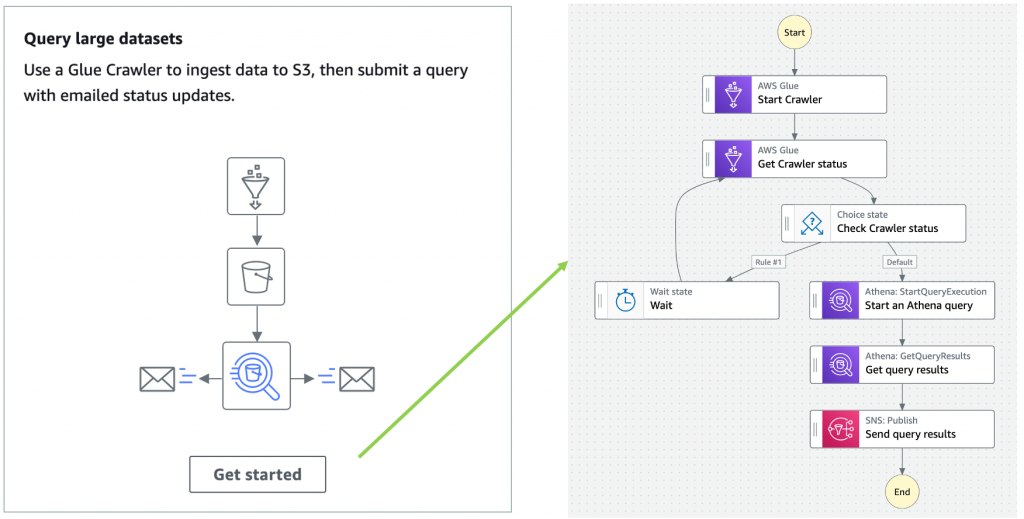AWS Compute Blog
Announcing winners of the AWS Graviton Challenge Contest and Hackathon
At AWS, we are constantly innovating on behalf of our customers so they can run virtually any workload, with optimal price and performance. Amazon EC2 now includes more than 475 instance types that offer a choice of compute, memory, networking, and storage to suit your workload needs. While we work closely with our silicon partners […]
Filtering event sources for AWS Lambda functions
This post is written by Heeki Park, Principal Specialist Solutions Architect – Serverless. When an AWS Lambda function is configured with an event source, the Lambda service triggers a Lambda function for each message or record. The exact behavior depends on the choice of event source and the configuration of the event source mapping. The […]
Using EC2 Auto Scaling predictive scaling policies with Blue/Green deployments
This post is written by Ankur Sethi, Product Manager for EC2. Amazon EC2 Auto Scaling allows customers to realize the elasticity benefits of AWS by automatically launching and shutting down instances to match application demand. Earlier this year we introduced predictive scaling, a new EC2 Auto Scaling policy that predicts demand and proactively scales capacity, resulting […]
Visualizing AWS Step Functions workflows from the Amazon Athena console
Amazon Athena console now provides an integration with AWS Step Functions’ workflows. You can use the provided patterns to create and visualize Step Functions’ workflows directly from the Amazon Athena console. Step Functions’ workflows that use Athena’s optimized API integration appear in the Athena console. To learn more about Amazon Athena, read the user guide.
Offset lag metric for Amazon MSK as an event source for Lambda
This post written by Adam Wagner, Principal Serverless Solutions Architect. Last year, AWS announced support for Amazon Managed Streaming for Apache Kafka (MSK) and self-managed Apache Kafka clusters as event sources for AWS Lambda. Today, AWS adds a new OffsetLag metric to Lambda functions with MSK or self-managed Apache Kafka event sources. Offset in Apache […]
Expanding cross-Region event routing with Amazon EventBridge
With cross-Region event routing in EventBridge, you can now route events to and from any AWS Region. This post explains how to manage and configure cross-Region event routing using CloudFormation and EventBridge resource policies to simplify rule propagation across your global event bus infrastructure. Finally, I walk through an example you can deploy to your AWS account.
Introducing mutual TLS authentication for Amazon MSK as an event source
This post is written by Uma Ramadoss, Senior Specialist Solutions Architect, Integration. Today, AWS Lambda is introducing mutual TLS (mTLS) authentication for Amazon Managed Streaming for Apache Kafka (Amazon MSK) and self-managed Kafka as an event source. Many customers use Amazon MSK for streaming data from multiple producers. Multiple subscribers can then consume the streaming […]
Insulating AWS Outposts Workloads from Amazon EC2 Instance Size, Family, and Generation Dependencies
This post is written by Garry Galinsky, Senior Solutions Architect. AWS Outposts is a fully managed service that offers the same AWS infrastructure, AWS services, APIs, and tools to virtually any datacenter, co-location space, or on-premises facility for a truly consistent hybrid experience. AWS Outposts is ideal for workloads that require low-latency access to on-premises […]
Setting up EC2 Mac instances as shared remote development environments
This post is written by: Michael Meidlinger, Solutions Architect In December 2020, we announced a macOS-based Amazon Elastic Compute Cloud (Amazon EC2) instance. Amazon EC2 Mac instances let developers build, test, and package their applications for every Apple platform, including macOS, iOS, iPadOS, tvOS, and watchOS. Customers have been utilizing these instances in order to […]
Publishing messages in batch to Amazon SNS topics
This post is written by Heeki Park (Principal Solutions Architect, Serverless Specialist), Marc Pinaud (Senior Product Manager, Amazon SNS), Amir Eldesoky (Software Development Engineer, Amazon SNS), Jack Li (Software Development Engineer, Amazon SNS), and William Nguyen (Software Development Engineer, Amazon SNS). Today, we are announcing the ability for AWS customers to publish messages in batch […]









